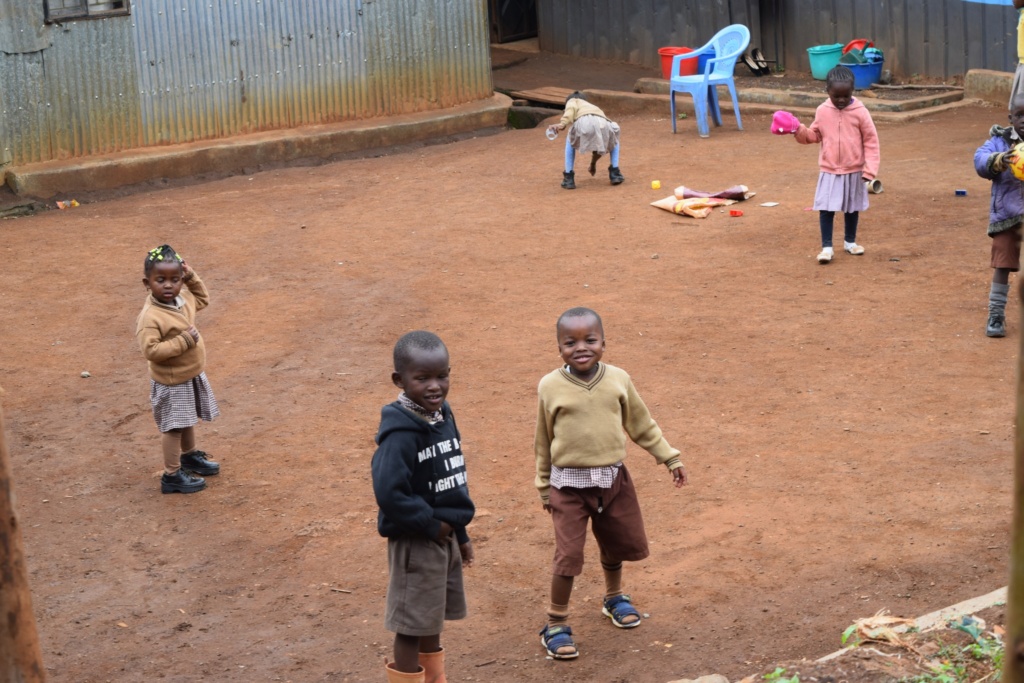


Our History
First of all, I want to thank you for visiting this website today. I am so grateful you are interested in getting involved. The image above is of me walking into the Centre of Love Kibera for the very first time. I wish to bring you along on that journey with me. Inside those doors is an incredible place.
Books for Kibera was born out of a deep passion for Africa and its people. After working on a major Capital Campaign to build a school in Kenya, I found myself reflecting on how I could continue making a difference in the lives of the people I met there. I knew I wanted to stay connected to the communities and causes that inspired me even if I was no longer working for the school.
I decided to put my professional background as a fundraiser and a writer to use to found an organization that I will be inspired to be part of for a long time to come. While many organizations excel at providing essential resources like water, healthcare, and education, I realized my own passion for books could help fill a different need. With this in mind, I launched Books for Kibera—a small nonprofit with a big heart, dedicated to empowering young people by fostering a love for reading and learning and by raising awareness for local community centers like the Centre of Love Kibera.
Partnering with amazing local community organizations that I worked with while in Kenya, I began collecting resources for children in Nairobi. Since our launch in 2024, Books for Kibera has received donated books for a community library in Kibera and is committed to nourishing young minds and providing educational opportunities that will inspire the next generation. We are also dedicated to raise awareness and funds for our partners on the ground in Africa.
My hope is that this initiative will continue to grow and make an impact for as long as it’s needed.
Thank you for joining me in this wonderful journey.

Tim Beresnyak, CFRE – Books for Kibera, Inc.
WHERE IS KIBERA?
Kibera is a unique and vibrant community, located in Nairobi, Kenya. It’s often described as the largest “urban slum” in Africa, but more accurately, it is an informal settlement—a community that has grown organically, without official urban planning or approval from city authorities.
In Kibera, life is challenging. It’s densely populated, and many residents live in inadequate housing, lacking access to clean water, sanitation, and secure shelter. Because areas like Kibera develop without formal infrastructure, essential services such as government schools, sewage systems, and reliable electricity are often absent. Roads and buildings aren’t always mapped, making daily life even more difficult.
Yet, despite these challenges, Kibera is filled with resilience, hope, and the potential for change. It houses some of the most incredible people you will ever meet.
You can find statistics about life in Nairobi, including information about informal settlements, here.
WHY DO PEOPLE LIVE IN KIBERA?
I once heard someone say that “nobody would wish to grow up in such a place if they had a choice.” The land and property owners of the shacks in the settlement charge very low rents, these low rents are still very high expenses for the local population of the city. The population of Kibera is increasing due to the urban migration of young people seeking to better their lives through higher education, better work opportunities and other opportunities that are not present in their local rural homes. Rents can be about $30 a month, and that is a lot to many where the average monthly salary is around $168.

The children pictured above are playing at an organization called The Centre of Love in Kibera, Nairobi. The Center of Love Foundation partners with Friends of Love Kibera and the NGAO Foundation to provide a safe place for women to come together to learn new skills, for children to play and for the community to access clean water and sanitation. The Center also provides meals and healthy produce for residents, feeding around 600 children each weekend. Our books will be available here, and in other centers around Nairobi.
A SIMPLE BUT POWERFUL SOLUTION. HOW CAN BOOKS HELP?
Throughout my two-decade career in the nonprofit sector, I’ve had the privilege of working on remarkable projects around the world. One moment that stands out vividly is an interview I conducted with the director of a school in Africa. This school had just been recognized as the top primary school in the country the year it opened. When I asked the director what the secret to their success was, his answer was surprisingly simple.
In many African schools, particularly in under-resourced areas, students often share textbooks. One student may use the book for a day, then pass it on to a classmate the next day. It’s easy to imagine the impact this has on learning. Some schools, he explained, would resort to photocopies of lessons, with even those being shared among pupils. The key to his school’s success? Every child had their own textbook, and that made all the difference.
While Books for Kibera isn’t yet able to provide custom textbooks for every school in Kibera, we are committed to sending resources for books at the community centers in Kibera and Kangemi, giving students access to learning materials they can use to thrive in their studies. We will provide notebooks and sketchbooks, so children can take notes and express their creativity as we begin this journey. Our mission is a simple one, we aspire to give children an opportunity to own their own learning materials and to unlock their creative potential.